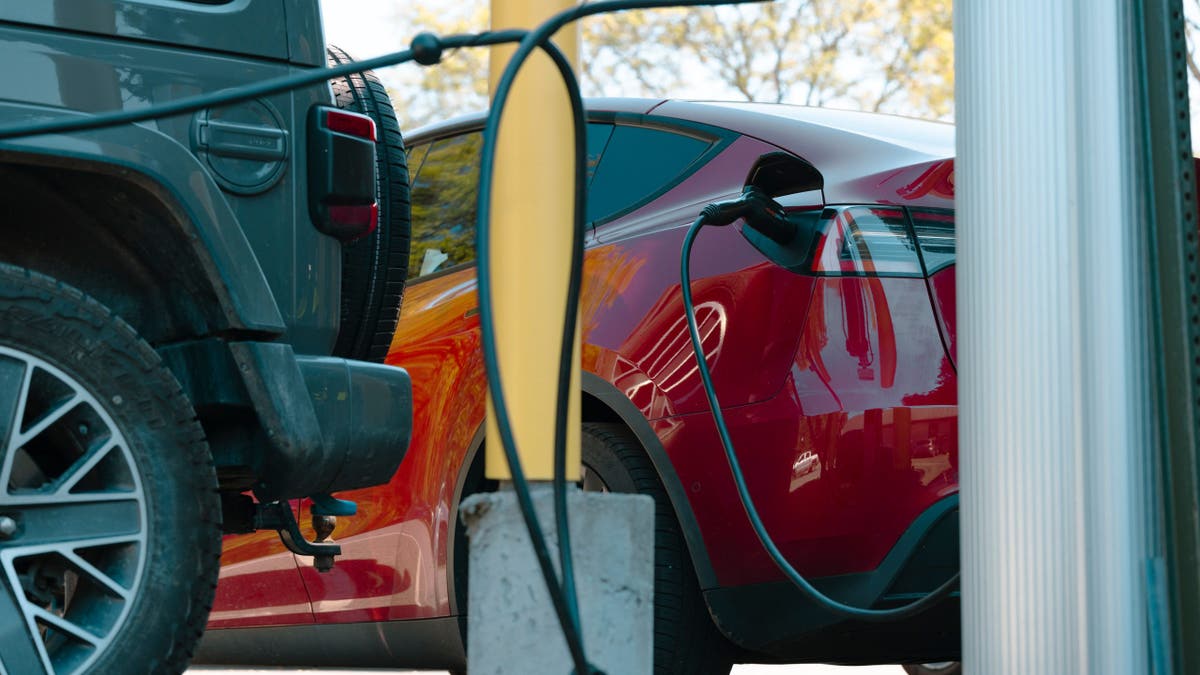New research reveals how EV, emissions mandates are inflating costs for gas-powered cars, utilities
FIRST ON FOX: The American Energy Institute (AEI), a trade organization representing oil, gas, coal and nuclear energy producers, is shining a light on how government subsidies for electric vehicles (EVs), combined with a regulatory credit system for vehicle emissions, are causing automobile and utility costs to rise.
Increasingly stringent Corporate Average Fuel Economy and greenhouse gas tailpipe emissions standards have forced gas-powered vehicle manufacturers to produce more EVs. As a result, this has siphoned auto manufacturers’ resources away from gas-powered vehicle production and toward EV production, ultimately pushing the costs of gas-powered cars higher, according a report by the AEI.
If auto manufacturers do not produce enough EVs to meet state and federal standards, they are forced to buy into a credit system to offset their emissions production, inevitably creating another avenue where additional costs are transferred to consumers, according to the report.
GOP LAWMAKER SEEKS TO SLAM BRAKES ON BIDEN’S ‘WOKE AND WASTEFUL’ EV TAX CREDIT
Utility costs also see an impact, AEI’s report points out. State and federal subsidy and rebate programs for EV charging infrastructure, while beneficial for utility companies’ profits, lead once more to increased costs that are subsequently passed on to rate payers. Forty states offer rebates for in-home level two chargers, while at the federal level, rebate and subsidy programs for EV charging infrastructure received an investment of roughly $7.5 billion under former President Joe Biden.
“By distorting the market with regulatory credits, subsidies, and behind-the-scenes rulemaking, federal agencies are shifting costs from affluent EV buyers to working-class Americans — while straining a grid that’s already under pressure,” said Jason Isaac, co-author of the report and the founder and CEO of AEI. “This isn’t about consumer choice or energy innovation. It’s administrative overreach that leaves Americans paying more to drive and to keep the lights on.”
Isaac, a former Texas state representative, admitted that during his time in the legislature, he worked to create an EV subsidy in the Lone Star State, which provided all EV buyers with a $2,500 tax credit. He said that over time, he realized the majority of fully electric vehicles were being purchased by wealthier individuals who, according to the National Bureau of Economic Research, would have done so even without the subsidies.
“This policy is not a home run,” said Hunt Allcott, a professor of environmental social sciences and a senior fellow at the Stanford Institute for Economic Policy Research, with regard to the federal EV tax credit system. “While the [Inflation Reduction Act’s] electric vehicle tax credits have slowed climate change and shifted production to U.S. manufacturing firms, they also impose high costs on U.S. taxpayers.”
TOP AGENCY STAFFER TRYING TO BLOCK CRUCIAL TRUMP DIRECTIVE ONCE MANAGED DEI TEAM
Each EV that’s purchased benefits from an estimated $94,000 to $153,000 in hidden subsidies over a 10-year period, according to research from the AEI. These figures account for the costs automakers bear to meet government mandates as well as losses from forced EV production, expenses that ultimately raise prices for consumers.

Rebates and subsidies for EV charging infrastructure are driving up base utility rates for consumers as well, the AEI report states. It is estimated that if each EV sold resulted in one in-home or commercial charging infrastructure, the more than 1.1 million EVs sold in 2023 would have received more than $827 million in residential charging tax credits.
Isaac said these rebates and subsidies are then used by utility companies to lobby public utility commissions to approve higher base rates because they are enhancing their infrastructure to improve EV infrastructure.
“When you go buy a gallon of gasoline, [taxpayers] are not helping you pay for that gallon of gasoline; all the costs are embedded within a gallon of gasoline,” Isaac said. “So the typical EV charge, whatever they pay at the charging station, is only a small portion of the expenses. That charging station itself has received a significant subsidy, both from the state and the federal government, and the utility has come in and increased the infrastructure or improved, enhanced the infrastructure to handle that load, and the rate payers in that particular area are picking up that burden.”
DEMOCRATS TURN ON TESLA DESPITE YEARS-LONG ELECTRIC VEHICLE PUSH

One anecdote used in the report to illustrate the cost burden of EV charging subsidies and rebates posits that if one homeowner were to purchase an EV charger on a street of 10 people, and the local electric company provides that homeowner with a $500 rebate, the downhill impacts lead to each of the 10 households shouldering a roughly $50 cost to build the charger as a result of the subsidized rate increases.
The increased costs on gas-powered car buyers and utility rate payers, Issac said, illustrates the need to get rid of these clean-air mandates.
CLICK HERE TO GET THE FOX NEWS APP
“Eliminating these costly EV mandates is exactly the kind of action needed under President Trump’s energy emergency,” Isaac said. “It would jump-start a resurgence in the American auto industry, lower the price of new vehicles and ease pressure on our electric grid, bringing down energy costs for every household.”
Fox News Digital reached out to several EV advocacy groups, including Drive Change. Drive Electric, Plug In America, DriveElectric USA, EVHybridNoire, the Sierra Club and the Electric Vehicle Association, but did not receive a response in time for publication of this story.
